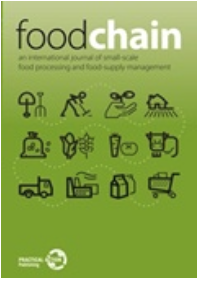
A special issue of the international peer reviewed journal 'Food Chain' has been guest edited by Valerie Nelson from the Natural Resources Institute. February's 'Food Chain' issue brings together a series of articles that draw on new research on the impact of Fairtrade, with a focus on Nicaragua, Malawi, Kenya and South Africa.
Fairtrade has expanded rapidly in recent years, particularly in certain products such as tea, coffee and cocoa. This expansion has brought greater scrutiny of the impact of Fairtrade from a development perspective.
This collection of papers by various authors, draws on detailed empirical studies of Fairtrade around the world, and asks pertinent questions about the efficacy of Fairtrade, as well as offering practical suggestions as to how improvements might be achieved.
Overall the articles in the new special issue present a valuable contribution to the on-going discussion on the effectiveness and impact of Fairtrade. Some consistent threads emerge across the papers, for example, the contextual variation in Fairtrade outcomes and impacts and the importance of scaling up impacts in the future.
A 'Crossfire' debate sees Matthew Anderson, University of Portsmouth debating with Philip Booth, Institute of Economic Affairs and Sushil Mohan, University of Brighton about whether Fairtrade has more impact than conventional trade, or trade involving other sustainability standards. Jason Donovan, World Agroforestry Centre, Lima and Nigel Poole, School of Oriental and African Studies, London, explore the specific case of a coffee producer organisation in Nicaragua and the role of NGOs and buyers in building supply capacity.
Muhaimina Said-Allsopp and Anne Tallontire investigate the gender dimensions of Fairtrade Joint Bodies in tea estates in Kenya in comparison with Gender Committees formed as a result of corporate codes of practice. Cheryl McEwan, Durham University, Alex Hughes and David Bek, Newcastle University, and Zaitun Rosenberg, an independent researcher, examine the role of place, including local geography, history and institutions, in relation to a Fairtrade raisins producer group in South Africa. Alastair Smith explores geographical issues in relation to Fairtrade certification in Malawi.
The edition also includes an article by Valerie and Adrienne Martin of the NRI, exploring the challenges and opportunities in the design of Fairtrade impact assessment studies. Valerie and Adrienne outline some practical steps for improving both utility and rigour in Fairtrade impact assessment, such as improving learning through facilitating learning alliances on a sub-regional level.
All the papers point to the need for Fairtrade to learn more about its effectiveness in different value chains and locations and to find ways to respond in a more flexible and informed manner to local conditions.

